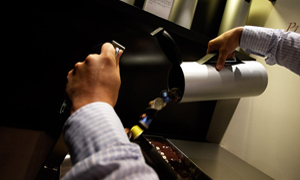Nestle-owned Nespresso, the world’s market leader of pod coffee, has announced a plan to invest £328 million (CHF 500 million) in the coming six years in the sustainability program aptly called «The Positive Cup.» Besides raising the standards for sustainably sourced coffee from African community farmers and reducing carbon emissions, the brand pledges to finally manage safe aluminum production and reach 100% waste recycling.
Nespresso and its ad face George Clooney have been frequently accused in the international media for leading the new global waste stream, meaning that poorly managed aluminum capsule waste along with the production of aluminum itself cause environmental damage. Moreover, the company has been blamed for fooling customers, offering capsuled coffee with lower caffein content and too long shelf life— which certainly affects the quality, taste and aroma of the coffee product.

Nevertheless, used aluminum capsules, which are not suitable for domestic recycling bins and must be specially collected, still remain the biggest environmental concern of the company. For the past five years, Nespresso has installed a number of special pod collecting bins in the brand’s boutiques across all international markets. In 2009, a dedicated R&D entity was founded — CELAA (an abbreviation from French «Club for Aluminium and Steel Light Packaging.») They developed and implemented at some recycling facilities in France the technology to find and separate small-scale aluminum waste from larger household trash.
Under the recently launched «The Positive cup» program, the company aims to collect 100% of used capsules and recycle them several times for the production of new capsules in such countries as UK, France, Switzerland, Belgium, Luxembourg, Netherlands, Austria and Italy. The material for virgin capsules is claimed to be sourced new Aluminium Stewardship Initiative standard. The company doesn’t share how it is going reach 100% recycling goal in the select markets.